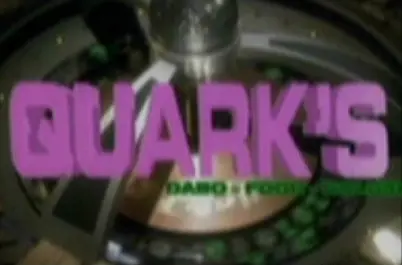data1701d (He/Him)
“Life forms. You precious little lifeforms. You tiny little lifeforms. Where are you?”
- Lt. Cmdr Data, Star Trek: Generations
- 136 Posts
- 341 Comments

 1·3 months ago
1·3 months agoJust to make sure - it’s not some cable hitting a fan in a case, right?
I’ve seen systems before where a cable is too close to a fan, and you don’t hear a noise until the fan speeds up.

 10·3 months ago
10·3 months agoNo VHS tape with not-quite-Gowron telling you to experience bIj?! That’s a deal-breaker.

 2·3 months ago
2·3 months agoUsually, you don’t need to bother much with drivers at all outside of Nvidia GPUs and Broadcom modems since the kernel is monolithic and contains most drivers.
On an ATX motherboard, I think it’s extremely rare for the ethernet chipset to require an out-of-kernel driver.

 4·3 months ago
4·3 months agoHonestly, even AMD to Intel would probably go mostly fine, considering the monolithic nature of the kernel and it having most drivers built in.
You’d probably want to make sure you have the Intel firmware package installed and make sure to remove configs specific to AMD stuff, like power management configs and kernel parameters, but it would still most likely boot.

 6·3 months ago
6·3 months agoHonestly, probably no. You’re switching to something with the same CPU generation and micro architecture, and the boards are by the same manufacturer with the same mobo chipset generation (both 5xx). It should be plug and play.
The only major change I can see the old CPU has an iGPU, while the new one doesn’t, meaning that you won’t be able to use the video port built into your motherboard, only the ports on your GPU. I’m guessing you probably weren’t using that HDMI port in the first place, so it’s probably non-issue.
EDIT: There is a small chance you’ll have to change your fstab depending on how it’s configured; if it’s done by drive UUID, it won’t be a problem.
Funny post, but “his/her” makes me think, “What about non-binary Klingons?”
That poses the interesting question: what is it like to be non-binary, or queer in general, as a Klingon? Sounds like a whole c/Daystrom Institute post I need to make.
Also, DuoLingo has lost its honor in general with its AI obsession and heavy layoffs; only a petaQ would use such a coward’s website.
The only way a true warrior can learn Klingon is the old ways - the Okrand books and tapes!
EDIT: Klingon Wiki is also helpful, as is KlingonSKA for searching words and Hol ‘ampaS for font-related stuff and digital versions of out-of-print Okrand tapes.

 6·3 months ago
6·3 months agoReplace the Macbook with a Thinkpad.

 2·3 months ago
2·3 months agoI think I made the mistake of pushing my grandfather away from Linux. He’s retired but does some professional photography; he’s used Photoshop for years, but said he’s open to leaving Adobe.
One day recently, he told me he heard about “this Linux thing” and asked me if it would be a good fit and run Windows applications well. I told him his main issue was probably Photoshop, and that even switching, he’d still need some stable, consistent way to open past PSD files. In retrospect, maybe I should have looked more closely at his use case to see the complexity of his edits and if they might have worked well in another program that runs on Linux.

 1·3 months ago
1·3 months agoI think for the MS Office thing, it depends on what it’s being used for. If it’s just creating a fresh document or editing a simple existing docx, LibreOffice it totally fine; I’ve heavily exclusively used LibreOffice Writer during my time in college and been okay, as I’m either just writing in MLA or using a provided Word file that I can then just save as an ODT after initial conversion and export as a PDF when it comes time to turn it in.
However, from what I can tell, if you’re working in an organization that extensively uses MS Office, files may need to survive multiple openings and edits between multiple editors, and multiple cycles of translating between document representations can lead to degraded documents and just make your work life absolutely miserable. Thus, LibreOffice isn’t an option, though I hear there are more MS-compatible suites that are usable on Linux, though not all of them FOSS.
This is why I’ve so far left my mother alone about Linux; maybe if I saw some evidence that her workflow would be more amenable to LibreOffice than I think it is, I’d reconsider.

 4·3 months ago
4·3 months agoI usually format my external drives to exFAT since it’s fully supported R/W on all major operating systems, in the slim chance I have to use macOS.
Still, no need for the OP to reformat their drive; NTFS tends to work just fine.

 5·3 months ago
5·3 months agoI wish there was a Lower Decks and VOY/DS9 version of this. However, I would cry a little having to design any PCB for that space, even if it’s as simple as registering a button or blinking an LED with a microcontroller.
Honestly, I’d be tempted to just do analog FM instead of Bluetooth and basically just make walkie-talkies. You could enable greater functionality, perhaps including Bluetooth support and being able to make voice commands, by having a “ship’s computer” that would just be a Raspberry Pi server or something with an FM receiver that could process the voice commands and route signals. You might have to hide it in a probe like a tricorder or a phaser while at cons, but if you’re just handing out Halloween candy or something like that, you shouldn’t have to worry.

 3·3 months ago
3·3 months agoPart of me wonders if you could cheat a bit and put the speaker in say, a tricorder prop.
Looking at the size of the iPhone 15’s speakers, I think it might actually be possible to fit it in. You might have to fudge the dimensions a little bit, but I think that could fit in a roughly combadge-sized space. The big question is getting the rest of the electronics to fit.
Sounds like a fun project for self-torture in KiCad.
EDIT: Another option to free up space would be to wear and conceal a throat mic. Heck, combined with the tricorder method, you could basically just make your combadge a glorified button.
I agree with other people that you should futz around with your GPU drivers and different Wayland compositors first, but also, if you ever had to reinstall, there is such thing as saving your dotfiles to significantly reduce setup time.
I don’t do that because I’m lazy, but it certainly is a thing
For reference, sharing your local IP address is a little like saying “I’m in room 223” (local IP address) and not saying what building (network) you’re in. Someone can’t walk into 223 in a different building and get to the same room you’re in.
Honestly, even if someone knew what network you were on, a local IP address wouldn’t be that useful because even if they successfully got on your network, as long as you have a properly-configured firewall and no vulnerable network-exposed services on your system, they can’t really do anything.
Honestly, while it’s still not a bright idea to tempt fate like that, even sharing your public IP isn’t that bad for the same reasons if it’s a competent home user; the worst that can happen on a properly-configured network is that someone tries and fails to exploit vulnerabilities that aren’t there and MAYBE drum up your internet bill. Also, for most ISPs, your public IP changes pretty often anyway, usually something like every few days to a week, due to changing DHCP leases.
I thought the same thing.

 3·3 months ago
3·3 months agoI mostly agree with the idea of using stable distros.
However, I will add that if you hate the default Debian installer and are willing to dig a bit through the website, they do have live USBs for each DE with a Calamares installer that I love. I really wish they would promote those more.
Honestly, they need to redo the whole Debian site.
Also, I find it funny you include 2018 in your range; I think that most things from 2018 could probably run almost any full modern distro competently, and that the better quality devices from 2015-2017 also wouldn’t struggle too much.

 8·3 months ago
8·3 months agoDebian with XFCE. It’s very stable with very little bloat compared to Ubuntu.
KDE might not run horribly, but XFCE was always snappy for me when I ran it on a similarly-aged, sinmilar performance Fujitsu Lifebook.





That’s just a VM running atop Docker container; convenient, perhaps, but a little misleading to users who don’t understand how Docker works and might think it’s better performance-wise than a VM.